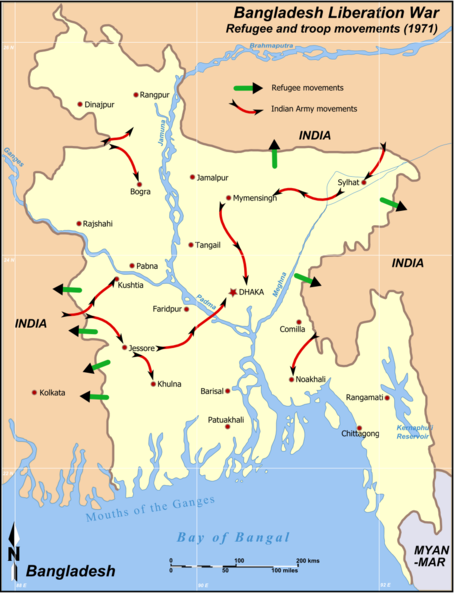Indian History
Indo-Pak War: 1971
- 07 Dec 2021
- 4 min read
Why in News
Recently, National Cadet Corps (NCC) has announced to conduct ‘Azadi ki Vijay Shrankhla aur Sanskritiyon ka Mahasangam’ event as part of Azadi ka Amrit Mahotsav (75th Anniversary of India’s Independence).
- Under Azadi ki Vijay Shrankhla' program, the bravehearts of the Indo-Pakistan 1971 War are being honoured at 75 locations throughout the country.
- Sanskritiyon ka Maha Sangam entails a special national integration camp will be conducted in New Delhi wherein candidates from all over the country will participate in cultural exchange.
Key Points
- Timeline of India-Pakistan War 1971:
- Political Imbalance: In the 1950s the centralised Pakistani state was run undemocratically by a military-bureaucratic oligarchy dominated by West Pakistan.
- Under this system, Bengalis had no political say. But West Pakistan dominance was challenged in 1970 during general elections.
- Landslide Victory of Awami League: East Pakistan' Sheikh Mujibur Rahman’s Awami League had a clear overall majority, enough to become the prime minister.
- However, west Pakistan was not willing to let a leader from its eastern provincial wing rule the country.
- Cultural Differences: The then West Pakistan (present Pakistan), under the leadership of Yahya Khan, started a brutal assault on the people of East Pakistan (present Bangladesh) who were demanding freedom because of the language and cultural differences between the two regions.
- After political negotiations failed, the Pakistani army under General Yahya Khan decided to start the crackdown.
- Operation Searchlight: West Pakistan kicked in operation searchlight across the whole of East Pakistan on March 26, 1971.
- This resulted in millions of Bangladeshis fleeing to India, mainly West Bengal, Assam, Meghalaya and Tripura.
- West Bengal, in particular, was massively burdened by the onrush of the refugees and the state appealed to the then Prime Minister Indira Gandhi and her government for assistance for food and shelter.
- Indo-Bangla Cooperation: With the subsequent bravery of the Indian Army coupled with the spirited fight put up by Mukti Bahini — the Bangladeshi guerilla resistance movement consisting of the Bangladeshi military, paramilitary and civilians — defeated the Pakistani forces.
- Defeat of Pakistani Military: On December 16, 1971, Lt Gen Amir Abdullah Khan Niazi, the Chief Martial Law Administrator of East Pakistan and Commander of Pakistan Army forces located in East Pakistan signed the Instrument of Surrender.
- Over 93,000 Pakistani troops surrendered to the Indian forces and Bangladesh Liberation forces making it the largest surrender since World War II.
- The intervention brought a conclusion to the war in 13 short days and led to the birth of a new nation.
- Political Imbalance: In the 1950s the centralised Pakistani state was run undemocratically by a military-bureaucratic oligarchy dominated by West Pakistan.
- Significance of Indo-Pakistan War For India:
- Diminishing the Two-front War Threat: The East Pakistan uprising provided India with the opportunity to break up Pakistan and eliminate the threat of a two-front war in any future confrontation.
- Although the eastern front remained largely inactive in 1965, it tied down substantial military resources that could have been deployed to greater effect in the western theatre.
- Departure from Non-Alignment: The India-Pakistan war was preceded by the signing of the Indo-Soviet Treaty in August 1971, which boosted India diplomatically.
- The victory defined India's much broader role in foreign politics.
- Many countries in the world, including the United States, realised that the balance of power had shifted to India in South Asia.
- Diminishing the Two-front War Threat: The East Pakistan uprising provided India with the opportunity to break up Pakistan and eliminate the threat of a two-front war in any future confrontation.







